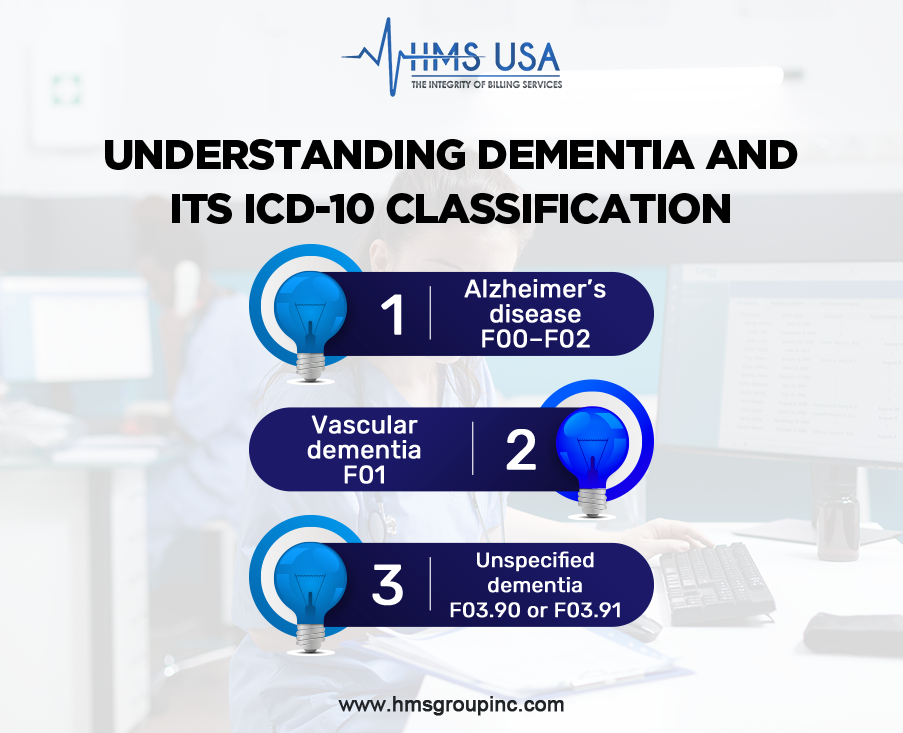Dementia is a progressive brain disorder that impairs memory, reasoning, and behavior, affecting millions worldwide. In medical documentation, accurate ICD-10 coding ensures proper diagnosis reporting, treatment planning, and reimbursement.
Among all dementia codes, ICD-10 Code F03.90, Unspecified Dementia Without Behavioral Disturbance, is used when the cause is not yet confirmed.
At HMS USA INC, we help healthcare providers maintain coding accuracy, compliance, and financial integrity. Our certified coders specialize in dementia-related documentation, minimizing denials and supporting maximum reimbursement.
Understanding Dementia and Its ICD-10 Classification
Dementia describes a group of cognitive disorders marked by memory decline and behavioral changes. Within the ICD-10 classification, dementia is divided by underlying cause:
- Alzheimer’s disease: F00–F02
- Vascular dementia: F01
- Unspecified dementia: F03.90 or F03.91
Using the right dementia ICD-10 code helps ensure precise clinical records, coordinated care, and claim accuracy.
What Is ICD-10 Code F03.90?
ICD-10 F03.90: Dementia, Unspecified, Without Behavioral Disturbance is used when a patient exhibits dementia symptoms, but the exact cause (e.g., Alzheimer’s, vascular dementia) has not been determined, and no behavioral issues are observed.
Example: a patient with memory loss and confusion but no confirmed etiology or aggression qualifies for F03.90. This placeholder ensures compliant documentation until further testing identifies a specific dementia type.
Official Coding Guidelines for F03.90
According to CMS and the World Health Organization (WHO), use this code only when:
- Clear cognitive decline is documented.
- The dementia’s cause is unknown.
- No behavioral disturbances are present.
Common mistakes:
- Using F03.90 when a cause is known (e.g., Alzheimer’s → G30.9).
- Omitting behavioral details (use F03.91 if behavior issues exist).
- Insufficient clinical documentation.
Comparing F03.90 With Other Dementia ICD-10 Codes
Understanding the distinctions avoids miscoding and claim denials:
| Code | Description | When Used |
| F03.90 | Dementia, unspecified, without behavioral disturbance | Cause unknown; no behavior issues |
| F03.91 | Dementia, unspecified, with behavioral disturbance | Cause unknown; agitation, confusion, or aggression present |
| F01.50 | Vascular dementia without behavioral disturbance | Dementia caused by poor cerebral blood flow |
| G30.9 | Alzheimer’s disease, unspecified | Alzheimer’s identified, stage not specified |
Tips for Accurate Dementia Documentation
- Record symptom onset and progression.
- Specify behavioral presence or absence.
- Document severity (mild/moderate/severe).
- Identify known causes, or note “unspecified.”
Close collaboration between providers and coders ensures clean claims and reduces payer rejections.
Why Accurate Dementia Coding Matters
Accurate dementia coding is important for good patient care, timely payments, and reliable health records.
Better Care Coordination
When dementia is coded correctly, all healthcare providers understand the patient’s condition. This helps them create the right treatment plan, manage medications, and offer proper support.
Timely Insurance Payments
Insurance companies use ICD-10 codes to check if treatments are necessary. If the code is wrong or unclear, payments can be delayed or denied.
Stronger Health Data
Accurate coding helps build better data for research, healthcare planning, and policies about aging and brain health.
In short, using the F03.90 code correctly supports accurate billing, clear documentation, and better patient care.
Common Challenges in Coding Dementia Cases
1. Unclear Cause of Dementia
Sometimes, medical records don’t mention whether dementia is caused by Alzheimer’s, stroke, or another issue. This often leads to using the unspecified code F03.90, which may affect clarity and payment.
2. Incomplete Notes
If doctors don’t include details about symptoms, severity, or behavior, coders may have to choose general codes. This can lead to claim denials or errors.
3. Overuse of Unspecified Codes
While F03.90 is correct when the cause is unknown, using it too often can raise red flags during insurance reviews.

How to Improve Accuracy and Compliance
Electronic Health Records (EHRs) can prompt clinicians for missing details. Regular internal coding audits identify documentation gaps early, ensuring ongoing accuracy.
Best Practices for Medical Billers and Coders
1. Keep Learning and Stay Updated
Attend regular ICD-10 training sessions to stay informed about new coding rules and CMS updates. This helps avoid mistakes and ensures that codes are used correctly.
2. Use Smart Billing Software
Modern billing software with built-in error checks can find missing or incorrect codes before claims are sent. This saves time and prevents denials.
3. Do Regular Internal Audits
Checking your own work helps catch and fix mistakes early. Routine audits improve accuracy and protect your practice from compliance issues.
Work with Experts Like HMS USA INC
Partnering with HMS USA INC ensures accurate dementia coding and maximum reimbursement. Our certified coders verify all ICD-10 documentation, enhance compliance, and streamline your revenue cycle.
We specialize in medical billing, denial management, and credentialing, delivering compliant, efficient results across all specialties.
Bottom Line
Using ICD-10 Code F03.90 correctly is vital for compliant dementia diagnosis and payment integrity. Accurate documentation, regular audits, and expert coding prevent denials and protect your revenue.
Struggling with coding errors or dementia-related denials?
Let HMS USA INC refine your billing accuracy and strengthen your financial outcomes.
Contact HMS USA Inc. Today for Expert Medical Billing Support
FAQs
What does ICD-10 Code F03.90 represent?
It indicates dementia, unspecified, without behavioral disturbance, when symptoms exist but the cause is unknown.
How is F03.90 different from F03.91?
F03.90 = no behavioral issues; F03.91 = with behavioral disturbances such as agitation or confusion.
What is the ICD-10 code for vascular dementia?
F01 series, e.g., F01.50 (without behavioral disturbance) or F01.51 (with behavioral disturbance).
What is the ICD-10 code for Alzheimer’s disease?
G30 series: G30.0 (early onset), G30.1 (late onset), G30.9 (unspecified).
Why is accurate dementia coding important?
It prevents denials, ensures proper reimbursement, and supports patient-centered, compliant care.








